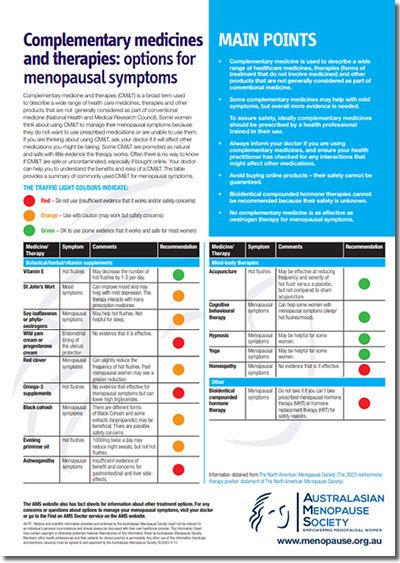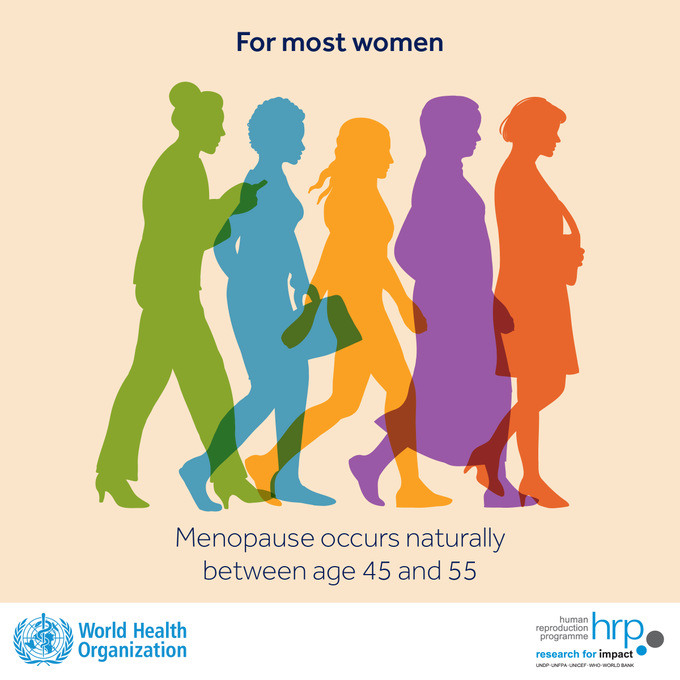“There are many alternative medicines that claim
to help ease the symptoms of menopause.
But few of them have been proved in studies”.1
Umbrella
What may the Complementary and Integrative Health and Menopause Umbrella include?
Depending on the Source (DotS) this Umbrella may include:
- Acupuncture
- Alternative Medicine Practices/Products/Remedies/Therapies/Treatments
- Ayurveda/Ayurvedic Medicine
- Bioidentical Hormone Therapy/Bioidentical Hormone Replacement Therapy
- Bioidentical Hormones
- Chinese Medicine Remedies/Therapies/Treatments
- Chiropractic
- Complementary Health Practices/Products/Remedies/Therapies/Treatments
- Complementary Medicine (CM)
- Complementary Medicine Practices/Products/Remedies/Therapies/Treatments
- Complementary and Alternative Medicine (CAM)
- Complementary and Integrative Health (CIH)
- Dietary Supplements
- Energy Medicine
- Herbal Treatments
- Homeopathy
- Hypnosis/Hypnotherapy
- Integrative Health Care/Medicine
- Manipulative and Body Based Therapies
- Massage/Remedial Massage
- Meditation
- Menopause/Perimenopause/Postmenopause
- Mind and Body Approaches/Practices/Therapies/Treatments
- Mindfulness
- Natural Approaches/Practices/Products/Remedies/Therapies/Treatments
- Naturopathy
- Non Mainstream Health Care
- Nutrition/Nutritional/Dietary Approaches
- Osteopathy
- Prayer
- Psychotherapy
- Qi Gong
- Reflexology
- Reiki
- Relaxation
- Remedial Therapy
- Spiritual Healing
- Supplements
- Tai Chi
- Therapeutic Touch
- Traditional Chinese Medicine (TCM)
- Traditional Medicine
- Yoga
Complementary and Alternative Medicine
What is complementary and alternative medicine (CAM)?
DotS the definition of CAM may vary. In Menopause and Natural Therapies the (Australian) Jean Hailes for Women’s Health (JH) definition is:
Complementary Health Approaches
Is there an association between complementary health approaches and menopause symptoms?
In Menopause: Diagnosis & Treatment – Treatment: Alternative Medicine, dated 07 August 2024, the (United States) Mayo Clinic elaborate on:
- Plant Estrogens, also called phytoestrogens…
- Bioidentical hormones…
- Cognitive behavioural therapy…
- Black Cohosh…
- Yoga…
- Acupuncture…
- Hypnosis….
You may have heard of or tried other dietary supplements, such as red clover, kava, dong quai, DHEA, evening primrose oil and wild yam, a natural progesterone cream. There’s no scientific proof that they work. Some of these products may be harmful”.3
The NAMS 2023 Nonhormone Therapies Position Statement for Bothersome Menopause Symptoms
What did the results include in The NAMS 2023 Nonhormone Therapies Position Statement for Bothersome Menopause Symptoms, dated June 2023?
In The 2023 Nonhormone Therapy Position Statement of The North American Menopause Society: Results included:
Recommended: Cognitive-behavioral therapy, clinical hypnosis, selective serotonin reuptake inhibitors/ serotonin-norepinephrine reuptake inhibitors, gabapentin, fezolinetant (Level I); oxybutynin (Levels I-II); weight loss, stellate ganglion block (Levels II-III).
Not recommended: Paced respiration (Level I); supplements/herbal remedies (Levels I-II); cooling techniques, avoiding triggers, exercise, yoga, mindfulness-based intervention, relaxation, suvorexant, soy foods and soy extracts, soy metabolite equol, cannabinoids, acupuncture, calibration of neural oscillations (Level II); chiropractic interventions, clonidine; (Levels I-III); dietary modification and pregabalin (Level III)”.4
Where may I find Links related to The NAMS 2023 Nonhormone Therapies Position Statement for Bothersome Menopause Symptoms?
Your Country may have Links similar to:
The NAMS 2023 Nonhormone Therapies Position Statement for Bothersome Menopause Symptoms
- The 2023 Nonhormone Therapy Position Statement of The North American Menopause Society
- The 2023 Nonhormone Therapy Position Statement of The North American Menopause Society
- Consumer Video and Podcast Series: 2023 Consumer Videos and Podcasts – NAMS 2023 Nonhormone Therapies Position Statement for Bothersome Menopause Symptoms
Menopause Symptoms
What are some complementary health approaches for menopause symptoms?
On pages one and two in the Joint Position Statement By the British Menopause Society, Royal College of Obstetricians and Gynaecologists and Society for Endocrinology on Best Practice Recommendations for the Care of Women Experiencing the Menopause, first published online 10 June 2022, one of the recommendations is:
- “Alternative therapies, including cognitive behavioural therapy, may also improve hot flushes, nights sweats and other menopausal symptoms and can be considered in women who do not wish to take HRT or have contraindications to taking HRT”.5
In The 2023 Practitioner’s Toolkit for Managing Menopause: Management – Considerations for All Women, published online 30 October 2023, the authors note:
On pages two and three in Complementary & Alternative Therapies: Non Hormonal Treatments for Menopause Symptoms, reviewed November 2023, the (British) Women’s Health Concern (WHC) elaborate on:

- “Complementary and Alternative Treatments
- Cognitive Behavioural Therapy (CBT)…
- Herbal Treatments…
- Black Cohosh…
- St John’s Wort…
- Isoflavones and Soya Products (Plant substances found in the diet including red clover supplements)…
- Acupuncture…
- Non Hormonal Prescribed Treatments…
- Selective Serotonin Re-uptake Inhibitors (SSRI) [Fluoxetine, Paroxetine, Citalopram, Sertraline] Serotonin Noradrenaline Re-Uptake Inhibitor/Selective Serotonin Re-Uptake Inhibitors (SSRI-SNRI) [Venlafaxine]
- Gamma Aminobutyric Acid (Gabapentin) and Pregabalin…
- Clonidine
- Oxybutinin…
- Fezolinentant…
- Treatments for those who have had breast cancer…”.7
Black Cohosh
Is there an association between black cohosh and menopause symptoms?
In Black Cohosh: What Have We Learned?, last updated November 2024, the NCCIH elaborate on:
- “A 2023 review of 22 studies of products containing black cohosh extracts, alone or in combination with other herbs, found that they were potentially beneficial for overall menopause symptoms. Data on specific symptoms showed improvements in hot flashes but not anxiety or depressive symptoms
- It’s uncertain whether black cohosh can reduce hot flashes related to breast cancer treatment”.8
Safe or Not
Are natural therapies safe?
On page one in Complementary & Alternative Therapies: Non Hormonal Treatments for Menopause Symptoms, reviewed November 2023, the (British) WHC note:
Healthy Lifestyle
Is there an association between implementing or maintaining a healthy lifestyle and the improvement of menopause symptoms?
On page one in the Joint Position Statement By the British Menopause Society, Royal College of Obstetricians and Gynaecologists and Society for Endocrinology on Best Practice Recommendations for the Care of Women Experiencing the Menopause one of the recommendations is:
- “Women should be advised that implementing or maintaining a healthy lifestyle can improve menopause symptoms. A healthy diet (one low in saturated fat and salt and rich in calcium and vitamin D), stopping smoking, reducing alcohol intake and including regular exercise can be beneficial. Reducing caffeine intake may also improve symptoms”.10
Questions To Ask
What are some questions to ask health care providers about CIH?
The (United States) Endocrine Society’s Menopause Treatment: Questions For Your Healthcare Provider include:
- “What do you think are possible triggers for my hot flashes?
- Are there any lifestyle or dietary interventions that may diminish my symptoms?
- Should I consider medication for treatment of my symptoms? Hormonal or non-hormonal?
- If you are interested in hormonal therapy: Am I a good candidate for hormonal therapy, specifically are my cardiovascular and breast cancer risks low?
- Which lifestyle changes can I make that will decrease my menopause symptoms without medicine?
- Are there any alternative medicine treatments you would recommend I try for relief of my menopause symptoms?
- Are there any alternative medicines I should not use because they could interfere with medicines I take?”11
Health Care Provider
What if I choose to use CIH?
If you choose to use CIH it may be in your best interest to also choose to talk with your health care providers about this.
In Menopause: Diagnosis & Treatment – Treatment: Alternative Medicine the Mayo Clinic explain
What is the FDA?
FDA can be an abbreviation for the (United States) Food and Drug Administration.
Health Topics A-Z
Where may I find Health Topics A-Z related to Complementary and Integrative Health and Menopause?
In Health Topics A-Z you may find:
Links
Where may I find Links related to Complementary and Integrative Health and Menopause?
Your Country may have Links similar to:
Links
This Links List to third party websites is neither comprehensive nor exhaustive. Inclusion on this Links List does not imply endorsement or recommendation. Non-inclusion on this Links List does not imply non-endorsement or non-recommendation. Third party websites are not under the control of Meno Martha International Menopause Directory. Third party websites may contain explicit medical images and/or sexual references. Please read Meno Martha International Menopause Directory’s Links Policy before proceeding to a Link. Please contact Webmaster if you experience a problem with a Link.New or Updated
- Can Hot Flashes Be Managed Through Diet? [17 April 2025]
- Complementary Medicines and Therapies for Hot Flushes [April 2025]
- Complementary Medicines and Therapies: Options for Menopausal Symptoms [15 April 2025]

- Did You Know? Supplements and Medications Can Interact In Unexpected Ways [09 January 2025]
- Menopause and Natural Therapies [08 January 2025]
- Supplements: What Works, What Doesn’t and the Truth About Menowashing [08 June 2025]
- BMS TV: Complementary and Alternative Therapies
- BMS Update – Fezolinetant Licensed By the MHRA [21 December 2023]
- Bioidentical Hormones: Are They Safer?
- CBT for Menopausal Symptoms
- Can Hot Flashes Be Managed Through Diet?
- Cannabis and Public Health: About CBD
- Cognitive Behaviour Therapy (CBT) for Menopausal Symptoms
- Complementary & Alternative Therapies: Non Hormonal Prescribed Treatments
- Complementary Medicine
- Complementary Medicines and Therapies for Hot Flushes
- Complementary Medicines and Therapies: Options for Menopausal Symptoms

- Complementary and Alternative Medicine
- Complementary and Alternative Therapies [Topics]
- Complementary and Integrative Medicine
- Consumer Video and Podcast Series: 2023 Consumer Videos and Podcasts – NAMS 2023 Nonhormone Therapies Position Statement for Bothersome Menopause Symptoms
- Consumer Video and Podcast Series: 2024 Consumer Videos and Podcasts – Cognitive Behavioral Therapy and Menopause
- Consumer Video and Podcast Series: 2024 Consumer Videos and Podcasts – Preparing for Your Menopause Health Care Visit
- DHEA
- Did You Know? Supplements and Medications Can Interact In Unexpected Ways
- Does CBD Help With Anxiety?
- Drugs and Supplements: Herbs, Supplements and Vitamins [Topics]
- Emerging Research In the Management of Menopausal Symptoms
- Exercise In Menopause
- Find A Menopause Practitioner [United States and Other]
- Find An AMS Member [Australasian Menopause Society: Australia and New Zealand]
- Find Your Nearest BMS Menopause Specialist [British Menopause Society]
- Health Benefits of DIM [Diindolylmethane]
- Herbs and Supplements [Topics]
- Hormone Replacement Therapy (HRT): Alternatives To Hormone Replacement Therapy (HRT)
- Hot Flashes: What Can I Do? [+ Video: What Are the Signs and Symptoms of Menopause?]
- Hot Flushes, Night Sweats, Brain Fog? Here’s What We Know About Phytoestrogens for Menopausal Symptoms
- How Fezolinetant Changes Management of Hot Flashes [Video]
- Integrative Medicine
- Kratom: Unsafe and Ineffective
- Later Years (Around 50 Years and Over): Menopause and Post Menopause Health – Signs and Symptoms of Menopause [+ Video: Talking Menopause With Your GP] [Other Languages and Formats]
- Let’s Talk About Perimenopause
- Lubricant Alternatives: What To Use and What To Avoid
- Looking After Yourself During Menopause
- Managing Your Symptoms
- Maritime Pine
- Mayo Clinic Minute: Help With Hot Flashes Due To Menopause [+ Video Courtesy: Mayo Clinic News Network]
- Mayo Clinic Minute: How Lifestyle Changes May Help Manage Menopause Symptoms [+ Video]
- Mayo Clinic Q and A: Can Medications and Supplements Interact With One Another?
- Mayo Clinic Q and A: Does CBD Live Up To Its Claims?
- Menopause

- Menopause Checklist Podcast
- Menopause Hormone Therapy and Complementary Alternative Medicine, Quality of Life, and Racial/Ethnic Differences: The Study of Women’s Health Across the Nation (SWAN)
- Menopause Map: Downloadable Resources – My Personal Path Print Tools: Questions for Your Health Care Provider

- Menopause Map: Downloadable Resources – My Personal Path Print Tools: Symptom Tracker
- Menopause Patient Information [Videos] 5. Lifestyle Advice In Menopause & Perimenopause
- Menopause Preparedness Toolkit Video Series: Lifestyle Tips for Menopause Wellness
- Menopause Preparedness Toolkit Video Series: Mindfulness & Wellbeing During the Menopause Transition
- Menopause Preparedness Toolkit: A Woman’s Empowerment Guide
- Menopause Symptoms: Mayo Clinic Expert Outlines Hormone and Nonhormonal Therapies
- Menopause Treatment: Complementary Alternative Medicines
- Menopause Treatments: What Works, What Doesn’t
- Menopause and Natural Therapies
- Menopause, Perimenopause, Hormone Therapy and Other Treatments With Madelyn Butler, MD [Podcast]
- Menopause: Continuing the Conversation – A Holistic Approach To Menopause [Video]
- Menopause: Diagnosis & Treatment– Alternative Medicine
- Menopause: Ensuring A Tranquil Transition
- Menopause: Identification and Management [NICE Guideline Published: 12 November 2015 Last Updated: 07 November 2024]

- Menopause: Identification and Management: NICE Guideline [NG23] Published: 12 November 2015 Last Updated: 07 November 2024
- Menopause: Things You Can Do
- Menopause: Understanding the Changes and Finding Relief | Dr Susan Davis | The Proof Podcast EP 256
- National Center for Complementary and Integrative Health: Black Cohosh
- National Center for Complementary and Integrative Health: Dietary and Herbal Supplements
- National Center for Complementary and Integrative Health: Herbs At A Glance
- National Center for Complementary and Integrative Health: How Safe Is This Product or Practice?
- National Center for Complementary and Integrative Health: Hypnosis
- National Center for Complementary and Integrative Health: Kratom
- National Center for Complementary and Integrative Health: Placebo Effect
- National Center for Complementary and Integrative Health: Red Clover
- Natural Remedies To Help Manage Perimenopause Symptoms
- Natural Therapies
- Navigating Menopause: Expert Insights and Solutions | Dr Susan Davis | The Proof Podcast EP 245
- Navigating Menopause: Honest Answers To All Your Questions [+ Video: What To Expect in Menopause]
- Non-Estrogen Treatments for Menopausal Symptoms
- Nonhormone Treatments for Hot Flashes and Night Sweats
- Office of Dietary Supplements: Black Cohosh
- Office of Dietary Supplements: Dietary Supplement Fact Sheets
- Office of Dietary Supplements: Vitamin and Mineral Fact Sheets
- Probiotics May Help Boost Mood and Cognitive Function
- Pueraria
- Revolutionizing Menopause Management: A Deep Dive Into Fezolinetant [+ Video]
- Supplements for Menopause Symptoms: Are They Safe?
- Systematic Review and Network Meta-Analysis Comparing the Efficacy of Fezolinetant With Hormone and Nonhormone Therapies for Treatment of Vasomotor Symptoms Due To Menopause
- The First WHO Traditional Medicine Global Summit
- The Truth About Menopause Supplements | Dr Sarah Berry
- Therapy Could Be Effective Treatment for Non-Physical Symptoms of Menopause
- Tips To Help Manage Menopause Symptoms
- Traditional Medicine
- Traditional, Complementary and Integrative Medicine
- Treating Menopause Symptoms Without Hormones
- Using Natural Therapies In the Menopause Transition – Webinar
- Webinars: Previous – Non-Hormonal Pharmacological Interventions For VMS
- Webinars: Previous – Non-Pharmacological Interventions For VMS
- What if HRT isn’t right for me? And is cold-water swimming really the answer to everything? Your Menopause Questions Answered
- What Is Chasteberry, and What Can It Do?
- What Is Cognitive Behavioral Therapy?
Sources
Where may I find the Sources quoted?
You may find the Sources quoted at:
Sources
- Menopause: Diagnosis & Treatment – Alternative Medicine. 07 August 2024. Mayo Clinic https://www.mayoclinic.org/diseases-conditions/menopause/diagnosis-treatment/drc-20353401 Accessed: 22 April 2025
- Menopause and Natural Therapies. Last Updated: 07 October 2024. Last Reviewed: 08 January 2025. Jean Hailes for Women’s Health https://www.jeanhailes.org.au/health-a-z/menopause/menopause-herbs Accessed: 22 April 2025
- 2023 Nonhormone Therapy Position Statement of The North American Menopause Society: Results. June 2023. https://www.menopause.org/docs/default-source/professional/2023-nonhormone-therapy-position-statement.pdf Accessed: 22 April 2025
- Menopause: Diagnosis & Treatment – Alternative Medicine. 07 August 2024. Mayo Clinic https://www.mayoclinic.org/diseases-conditions/menopause/diagnosis-treatment/drc-20353401 Accessed: 22 April 2025
- Hamoda, H., Mukherjee, A., Morris, E., Baldeweg, S. E., Jayasena, C. N., Briggs, P., Moger, S. Joint Position Statement By the British Menopause Society, Royal College of Obstetricians and Gynaecologists and Society for Endocrinology on Best Practice Recommendations for the Care of Women Experiencing the Menopause. First Published 10 June 2022:1-2. https://journals.sagepub.com/doi/full/10.1177/20533691221104879 Accessed: 22 April 2025
- Davis, S. R., Taylor, S., Hemachandra, C., Magraith, K., Ebeling, P. R., Jane, F., and Islam, R. M. The 2023 Practitioner’s Toolkit for Managing Menopause: The 2023 Practitioner’s Toolkit for Managing Menopause: Management – Considerations for All Women. Published Online: 01 October 2023 https://www.tandfonline.com/doi/full/10.1080/13697137.2023.2258783 Accessed: 22 April 2025
- Complementary & Alternative Therapies: Non Hormonal Treatments for Menopause Symptoms. Review Date: November 2024:2-3. Women’s Health Concern https://www.womens-health-concern.org/help-and-advice/factsheets/complementaryalternative-therapies-menopausal-women/ Accessed: 22 April 2025
- Black Cohosh: What Have We Learned? Last Updated: November 2024. National Center for Complementary and Integrative Health https://www.nccih.nih.gov/health/black-cohosh Accessed: 22 April 2025
- Complementary & Alternative Therapies: Non Hormonal Treatments for Menopause Symptoms. Review Date: November 2024:1. Women’s Health Concern https://www.womens-health-concern.org/help-and-advice/factsheets/complementaryalternative-therapies-menopausal-women/ Accessed: 22 April 2025
- Hamoda, H., Mukherjee, A., Morris, E., Baldeweg, S. E., Jayasena, C. N., Briggs, P., Moger, S. Joint Position Statement By the British Menopause Society, Royal College of Obstetricians and Gynaecologists and Society for Endocrinology on Best Practice Recommendations for the Care of Women Experiencing the Menopause. First Published 10 June 2022:1. https://journals.sagepub.com/doi/full/10.1177/20533691221104879 Accessed: 22 April 2025
- Menopause Treatment: Questions For Your Healthcare Provider. 24 January 2022. Endocrine Society https://www.endocrine.org/patient-engagement/endocrine-library/menopause-treatment Accessed: 22 April 2025
- Menopause: Diagnosis & Treatment – Alternative Medicine. 07 August 2024. Mayo Clinic https://www.mayoclinic.org/diseases-conditions/menopause/diagnosis-treatment/drc-20353401 Accessed: 22 April 2025








